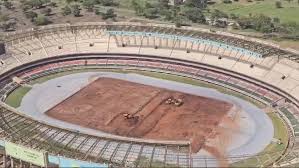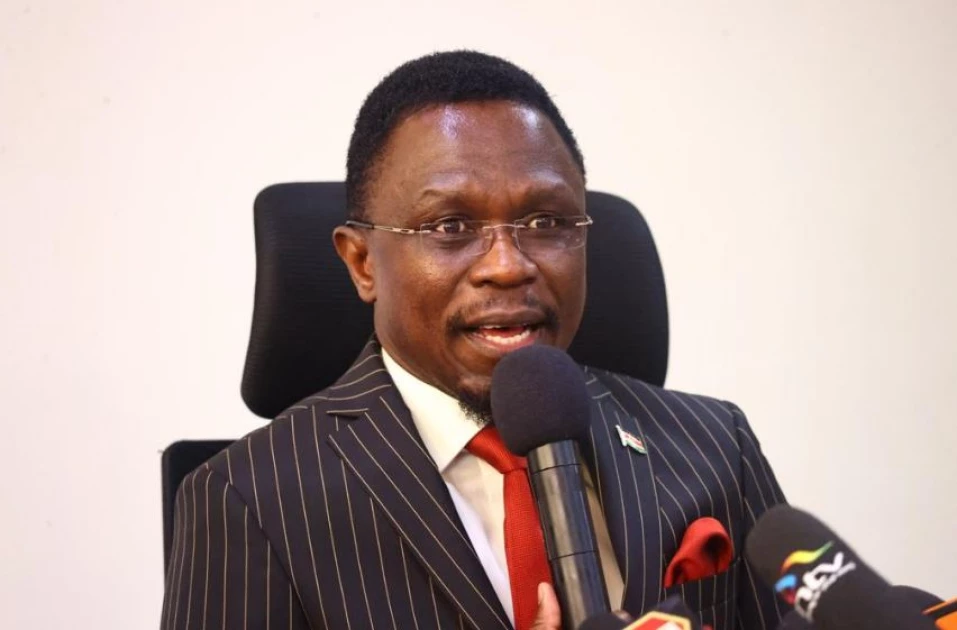Former Sports Cabinet Secretary Ababu Namwamba has taken a strong stance against the common practice of labeling many of Kenya’s sports facilities as “International Stadiums.” In a recent statement, Namwamba criticized this trend, arguing that it is misleading and an affront to the intelligence of Kenyans. He pointed out that many of these stadiums, such as Wang’uru and Kirigiti, do not meet the standards implied by the “international” tag.
Namwamba expressed his concern that the term “international” should signify a facility that meets global standards in terms of infrastructure, safety, and capacity to host major events. However, he noted that the reality of most Kenyan stadiums falls far short of these expectations. The use of such labels, according to Namwamba, is not only inaccurate but also hinders the progress of developing truly world-class sports facilities in the country.
During his tenure as Sports Cabinet Secretary, Namwamba made it a priority to address the shortcomings in Kenya’s sports infrastructure. He is particularly proud of his role in developing Kenya’s first sports infrastructure master plan, a comprehensive blueprint aimed at elevating the country’s sports facilities to meet international standards. Central to this plan is the Talanta Sports City project, which Namwamba describes as a genuine international-level stadium. This ambitious project is designed to provide Kenya with a state-of-the-art sports complex that can host major international events and offer top-tier facilities for athletes to train and compete.
Namwamba believes that the Talanta Sports City project represents a critical step forward for Kenya’s sports infrastructure. Unlike the mislabeling of substandard venues as “international,” this project is set to meet the true criteria of international standards. He emphasized that this development is not just about building a stadium but about creating a sports infrastructure that can propel Kenyan sports to new heights, both in terms of athlete performance and the ability to host global competitions.
The former Sports Cabinet Secretary also highlighted the broader impact that quality sports infrastructure can have on the country. He argued that without proper facilities, Kenyan athletes are at a disadvantage on the global stage, as they lack the resources and environments necessary to train at the highest levels. By investing in truly international-level stadiums and facilities, Kenya can better support its athletes and improve its standing in global sports.
Furthermore, Namwamba pointed out that high-quality sports infrastructure has the potential to drive economic growth. International-standard venues can attract global events, tourism, and investment, which in turn create jobs and stimulate local economies. This economic impact, combined with the potential for increased global recognition, makes the development of genuine international-level sports facilities a crucial aspect of national development.
However, Namwamba also acknowledged the significant challenges that come with implementing such an ambitious master plan. Funding remains a primary obstacle, as developing world-class sports facilities requires substantial investment. Securing the necessary resources has been a persistent issue, and it will take concerted efforts from both the government and private sector to address this challenge.

In addition to funding, Namwamba emphasized the importance of proper maintenance and management of existing sports facilities. He noted that even the best stadiums can quickly deteriorate without adequate upkeep, leading to a decline in their usefulness and safety. To prevent this, Namwamba called for the establishment of dedicated bodies responsible for the maintenance and management of sports venues, ensuring they remain in top condition for both local and international events.
Political will and public support are also crucial in driving the sports infrastructure master plan forward. Namwamba urged the current government to prioritize sports infrastructure as a key component of national development. He called on policymakers to work closely with stakeholders in the sports sector to ensure that the vision for projects like Talanta Sports City becomes a reality.
Looking to the future, Namwamba is optimistic that with the right approach, Kenya can overcome the challenges it faces in sports infrastructure development. He sees the Talanta Sports City project as a model for future initiatives, demonstrating that Kenya has the capacity to build and maintain facilities that meet international standards.
Namwamba also stressed the need for transparency and accountability in the management of sports projects. He believes that ensuring funds are used efficiently and projects are completed on time and to the required standards is essential for avoiding the pitfalls that have hindered previous infrastructure efforts.
In conclusion, Ababu Namwamba’s criticism of the “international” label on many of Kenya’s stadiums is a call to action for the country to invest in genuine sports infrastructure. His vision for projects like Talanta Sports City reflects a commitment to raising the standards of Kenyan sports facilities to truly international levels. By addressing the challenges of funding, management, and political support, Kenya has the opportunity to build sports infrastructure that not only lives up to the “international” title but also brings lasting benefits to athletes, fans, and the nation as a whole.
ALSO READ:Gor Mahia Seeks New Venue for Al Ahly Clash as Nyayo Stadium Closes for Renovations


